REDMOND, Wash. , Oct. 12, 2005 — Bill Gates is headed back to college today. Six colleges to be precise — all top IT and engineering institutions across North America.
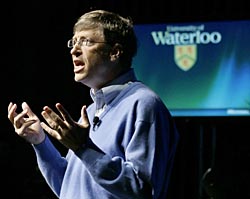
Microsoft Chairman and Chief Software Architect Bill Gates speaks to students at the University of Waterloo in Ontario, Canada. Oct. 13, 2005.
It’s part of a three-day tour the Microsoft chairman and chief software architect is taking this week. The goal: To talk to students and faculty about leading-edge technologies and their potential to change the way people live and work, and to underscore the vital role of computer science in the world today and in the future.
Gates’ itinerary includes the University of Michigan in Ann Arbor; the University of Wisconsin in Madison; New York City’s Columbia University; Princeton University in New Jersey; Howard University in Washington, D.C., and the University of Waterloo in Ontario, Canada. He’ll visit two colleges per day. To learn more about the Oct. 12 – 14 tour, and what Gates and Microsoft hope to achieve by it, PressPass spoke to Kevin Schofield, general manager of strategy and communications at Microsoft Research, who is accompanying Gates in the halls of academia.
PressPass: This is the second year Gates has made a college tour. What does Microsoft hope to accomplish with these tours?
Schofield: It’s really about listening as much as it is about us talking. It’s an opportunity for us to talk with students, meet with faculty, and see what’s on their mind. What’s going on out on campus? How is technology being used on campus? What are people interested in? In particular, the tour is about having a conversation about the field of computer science. Where is it today? Where is it going? Why do we as a company have this fundamental optimism about the field of computer science, the impact it’s having on the world, and the bright future that we think it’s going to have both in terms of the great things it’s going to do and the job opportunities in the field, and why we think people should be excited to go into this field.
PressPass: What is it about interacting with students like this that is so important?
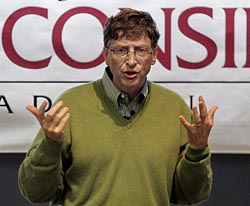
Bill Gates addresses University of Wisconsin computer science and engineering students. Madison, Wisc. Oct. 12, 2005
Schofield: Think about this audience of undergraduates and graduates. They have never known a world without PCs. They’ve grown up with PCs. But beyond that, they’ve learned that personal computing is something they should expect. Computers end up in everything — in cars, in entertainment devices such as MP3 players. As they get smaller, they are in things we can carry around with us. So students have created a culture around computing and entertainment devices and IT technology that is fundamentally different from Bill’s culture or my culture. This gives them a different view on technology, its uses and how it should be incorporated in their lives, and that is driving a lot of the future uses of technology at least in that domain.
A lot of the ways they’ve been using technology are things that we can’t design or plan for. They just do them, and that’s a super interesting thing for us to hear about. How does technology fit into their lives? How does it fit into their learning experience? What expectations do they place upon their professors and learning environment? Do they expect professors to provide copies of PowerPoint slides? How do they take notes today? On their laptop or Tablet PC, or are they still using paper notebooks, and what are the demographics around that? How do they go about writing papers? How do they go about doing research for papers? Do they go to the stacks in the library now, or do they do all it online with MSN Search or Google or other search engines? How has the learning process changed for them?
And then what are the issues on the faculty side? What are the issues with enrollment for computer science programs and enrollment in science and technology in general? What are the percentages of women in engineering and computer science, and what effect have the trends in that area — which have been fairly negative — had on enrollment, and what are they doing about it? How can we support them better? What are the issues with funding for research? That’s the kind of conversation we just love because it helps us understand what’s going on there, and what the expectations are for the computing and learning environment, and for computing in their lives. It also gives us good information about how we can be a better partner for academia.
PressPass: Part of Gates’ message to students is that the opportunities for computing to change the world have never been greater. What is meant by that statement?
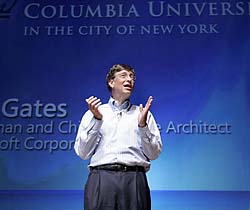
Bill Gates speaks at Columbia University, New York, N.Y. Oct. 13, 2005.
Schofield: I’m not going to steal all his thunder because he’s definitely going to talk about that. But let me just say that, although computing is an integral part of the lives of thousands of students, there are billions of people in the world for whom that is not true. There’s still a huge digital divide. The divide is about information and communications, and what having access to information and communications does to people’s lives, their career opportunities and their ability to make a living. At Microsoft, we look at these technologies and see the price continuing to come down and their availability getting wider, and we ask how we can bridge the digital divide. There’s a lot of interesting academic research being done about that. There are many people thinking about that in companies, in government, in academia. We’ve also been doing a lot of thinking about it at Microsoft. There’s an opportunity to improve the livelihoods of billions of people around the world, not just at the level of computing improving people’s lives. There are specific industries, like the life sciences, that are being fundamentally revolutionized by computing technology. That’s something that I know Bill has a lot of thoughts about, and I expect him to share those thoughts on the tour.
PressPass: What does Microsoft see as the biggest challenges facing people today for which software can provide the answers?
Schofield: I don’t think it’s necessarily that we have software solutions for the challenges people are facing today. I think it’s much more interesting to look at the things software cannot do yet that are big challenges for people. We know software will be able to do them. We see the ongoing march of Moore’s Law and the continued advances in technology and bandwidth and communications ability, so computing will get there eventually. The question is, who is going to invent those technologies? Who are the researchers in academia? Who are the researchers in companies like Microsoft or other tech companies? Who are the start-up companies that are going to invent the vaccines and the new computing technologies that are going to help us stay better connected to our families and our friends and our co-workers? Who’s going to invent the next technology that is going to help us be better organized?
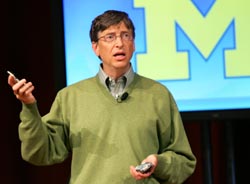
Bill Gates discusses computer-science careers with students at the University of Michigan. Ann Arbor, Mich., Oct. 12, 2005.
For example, we still haven’t cracked the problem of creating a computer that can listen, speak, understand language and see as well as a person does. That’s a gold standard that’s a long way away. There’s a huge amount of work that we still need to do. But we’re absolutely going to get there maybe 10 years, 20 years, 50 years from now. You watch the research community and there’s this constant movement forward in these areas, and that’s what gets us super excited about the field of computer science and investing in research and being in this industry. It’s because there’s still huge opportunity in front of us to solve these problems that are going to make people’s lives better, advance technology and enable us to create fantastic new products that we haven’t even imagined.
PressPass: What are some of the trends and developments that are ushering in new opportunities for software innovation?
Schofield: I’ll mention three of many. One trend is e-science, or taking computing and using it to improve the scientific process. In the life sciences and pharmaceutical industries, we’re using computing today to decode the human genome, which will give us incredible new insights into how to design medical treatments for specific problems. Another trend is computer entertainment, and the rise of not only things like MP3 players but also digital video recorders (DVRs). You can see VHS and soon maybe even DVDs becoming obsolete, because we’ve taken a basic computing architecture and applied it to this problem of watching television or movies, and looked at how can we change that and make it a better experience. The third trend is in the area of communications, and particularly real-time communications. We’re looking at how we can use a high-bandwidth networking environment to get beyond just doing conference calls. How can we make that better with computing technology so that we do a better job of transcribing phone calls, including video as well as audio, improving audio and enabling the sharing of applications so that it becomes a fully rich collaborative environment, beyond just talking to somebody on the other end of a phone line. That’s another area where we’ve just scratched the surface of what we can do.
PressPass: What is the significance for Microsoft of sagging student enrollment in computer science?
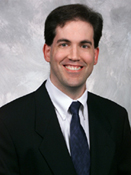
Kevin Schofield, General Manager, Strategy and Communications, Microsoft Research
Schofield: This worries us because we look at all these opportunities for the field of computer science, and how we can affect all these other fields, and we want to grow as a company. We have all these businesses and we want to grow all of them because they’re not reaching a huge proportion of the people in the world. We think there’s great opportunities and great markets for them and great functionality that we want to build into our products. But if we can’t hire the people to build these products, then we’re not going to be able to go do that. So we want to make sure that there’s a rich pipeline of great talent that we can hire to build fantastic products, in our own company and in our partners’ companies as well, because it’s about the whole industry and not just the products that Microsoft owns itself. Beyond just ourselves, there’s an impact on the economy of the United States, Canada and other countries, because computing is affecting every industry. If you look across a number of different companies and industries, they’re all being driven by IT and IT events. That’s what our economy is about. But if we don’t have the talent in this country that we can hire, it’s going to affect our economy as a whole. It’s a competitive issue for our economy versus the economy of other countries.
PressPass: What is the significance for Microsoft of the waning federal support for fundamental IT research?
Schofield: There are two main points to make here. Firstly, coming back to the economy again, what is the importance of innovation to our economy, far beyond just the obvious connection to the IT industry? A lot of pharmaceutical research — such as decoding the human genome or inventing new kinds of therapies — is being done in academia in close partnership with industry. So federal funding for IT going into academia is driving forward the life sciences industry. Likewise, federal funding for IT research in security — in networks and a number of different areas — is driving academia, and research in academia causes innovation to get transferred out into industries to create advances to continue to drive the IT industry forward.
Through history you can see that all of the fundamental technologies that are driving the IT economy today and the IT infrastructure that we all depend upon started with federal funding for research in academia — whether it’s the Internet, fundamental networking protocols, information retrieval research that spun out a large number of startups, or Web browsers, which were funded by fundamental research at the University of Illinois for Mosaic. We can’t afford not to do that because we have seen time after time that it’s what really drives our economy. We don’t want that well to dry up because it will affect our competitiveness and it will slow down innovation as a whole.
Secondly, federal funding for research actually drives education. A lot of it is used specifically to pay for graduate students and research assistants, so the Ph.D. pipeline is being funded by federal research funds. If that funding goes away, our pipeline of great Ph.D.’s — that Microsoft and Google and other tech companies are hiring to continue to advance our products — also goes away. What happens to our industry if there are no more Ph.D.’s? We don’t want that, because it’s very important for continuing the constant pace of innovation in our industry.




